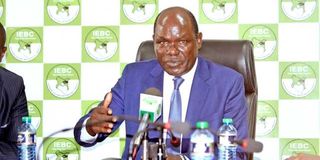Big worries over electoral body and 2022 polls

IEBC chairman Wafula Chebukati addresses journalists at Anniversary Towers in Nairobi last October.
What you need to know:
- Parliament has barely dealt with the legislative reforms, including some drafted by the Independent Electoral and Boundaries Commission.
- The next elections will be held in August 2022, which, as of today, is just 24 months away.
Kenyans will be heading to the polls in another two years, yet the pace of reforms at the electoral commission remains a major concern as little has been done to address the failures of 2017.
Three years after the last elections, Parliament has barely dealt with the legislative reforms, including some drafted by the Independent Electoral and Boundaries Commission (IEBC).
The next elections will be held in August 2022, which, as of today, is just 24 months away.
Currently pending before Parliament are the Election Campaign Financing (Amendment) Bill, the Independent Electoral and Boundaries (Amendment) Bill and the Referendum Bill.
The Independent Electoral and Boundaries (Amendment) Bill seeks to amend section 36 of the Independent Electoral and Boundaries Act to guide the redrawing of electoral boundaries.
There is also a proposal to provide a recruiting mechanism for new commissioners. All these reforms are behind schedule as concerns mount that Parliament may wait until the last minute to pass the laws.
Avoid the ugly battles
After turf wars between commissioners and the secretariat, there have also been calls to legislate a clear definition of their respective roles so as to avoid the ugly battles for IEBC’s control.
The commission has been running with just three commissioners — chairperson Wafula Chebukati, Prof Abdi Guliye and Mr Boya Molu — which is the barest minimum, meaning that the absence of one of them cripples the commission. The process of filling the vacancies is yet to start.
Instead, the Building Bridges Initiative (BBI) report recommended overhaul of the IEBC and replacing the current commissioners with a team partially appointed by political parties, a potentially divisive proposal.
The CEO’s recruitment has also stalled as a court case challenging the process remains unresolved. Prof Guliye says the commission, having been disrupted by the Covid-19 pandemic, is still working on some relevant process-and-procedure manuals and hopes to wrap up the exercise by the end of the year.
Seeing next year will be marked by high-octane politics and IEBC will also be embarking on procurement of key electoral materials ahead of 2022 General Election, there is concern among electoral experts and observer groups that time may not be on the IEBC’s side.
“We’re two years to the next poll if August still holds as the election date, which means the window for reforms is slowly closing, and if we don’t start pushing and getting some of these policies, rules, regulations and structures in place, we risk repeating the same mistakes we made in 2013 and 2017 and even earlier,” warned Ms Regina Opondo, the chairperson of the Election Observation Group (ELOG) steering committee.
Mr Ndung’u Wainaina, the executive director of International Centre for Policy and Conflict, told the Nation that the IEBC needs to be given financial autonomy and to devolve its resources down to the polling stations.
“IEBC should be reformed to restore public confidence, credibility and integrity. The problem is not the Constitution, but how the IEBC Act and recruitment of personnel is designed, which allows gross political interference,” Mr Wainaina said in an email to the Nation.
Commendable work
Mr Felix Owuor, the executive director of Electoral Law and Governance Institute for Africa, acknowledged that while some commendable work has been done by the electoral institutions, namely the IEBC, the Office of the Registrar of Political Parties, the Political Parties Dispute Tribunal and the judiciary, post-2017, a lot remains to be.
“I think the fundamental question is whether we’re better off now in terms of preparations than we were in the last parliamentary term,” he said.
Parliament’s slow pace towards enacting the proposed legislative reforms has been singled out as the biggest impediment.
The Handshake politics and the infighting within Jubilee Party has complicated Parliament’s agenda as competing interests clash.
Nandi Senator Samson Cherargei says Parliament seems to have frozen action on electoral reforms and is waiting for the final recommendations of the BBI to guide the process.
Unfortunately, he says, that would mean that Parliament acts very late in the day for IEBC to internalise and implement the changes.
“We need reforms before the 2022 elections. But I can tell you that if you are waiting on Parliament, you may be disappointed,” he told an ELOG webinar on election preparedness.
Prof Guliye said the IEBC has furnished Parliament with all the information on areas that need review as well as the drafts of the reviews and is concerned at the speed with which parliament is dealing with the proposals.
“As a commission, we do not legislate but only advise the relevant institutions and here we deal with Justice and Legal Affairs Committee of both the Senate and National Assembly,” Prof Guliye said.





